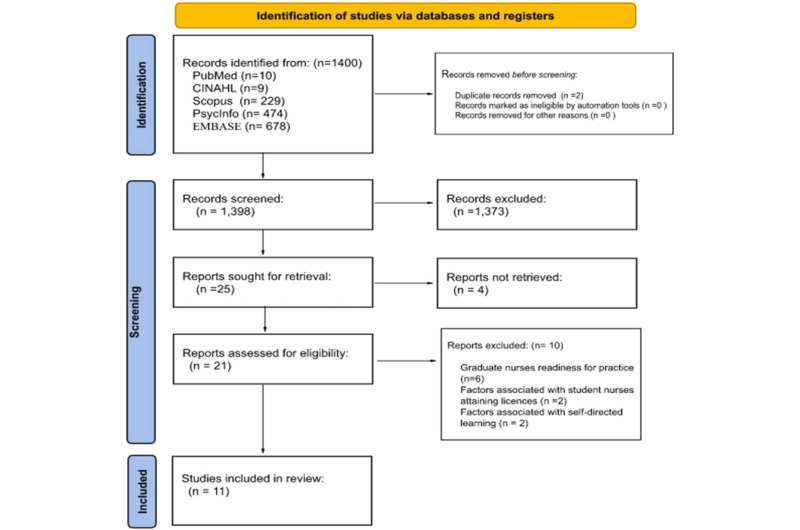This article has been reviewed according to Science X's editorial process and policies. Editors have highlighted the following attributes while ensuring the content's credibility:
fact-checked
trusted source
proofread
Study shows gaps in new nursing graduates' work readiness

About 60 percent of nurses with less than two years' work experience are uncomfortable with performing procedures of higher complexity—such as responding to a critical clinical emergency, performing tracheostomy (a surgically created hole in the windpipe) care and suctioning, and chest tube care independently. This requires a lengthened duration of supervision for such procedures in order to ensure the quality of care is never compromised.
The findings were from a study conducted by Singapore General Hospital (SGH), Sengkang General Hospital (SKH), and Singapore Institute of Technology (SIT) to determine how work-ready new nursing graduates are when they join the workforce.
"We wanted to examine how to help best young graduate nurses adjust to their new roles as they transition to the workforce, and this study highlighted the key challenging areas they encountered when they started work," said Dr. Lim Siew Hoon, Nurse Clinician, Division of Nursing, SGH, and corresponding author of the study.
Between November and December 2022, the SGH-led team surveyed more than 450 nurses who joined SingHealth institutions within two years after graduation with either a local diploma or a bachelor's degree.
The findings further showed that more than 40 percent of respondents felt overwhelmed by ethical issues associated with patient care responsibilities, such as when a patient's family's desire conflicts with the required care for the patient. Thirty-seven percent of the nurses surveyed had difficulty managing a dying person.
Twenty-six percent also felt challenged in prioritizing the care needs of multiple patients at any one time, when, for example, a junior nurse has to handle a patient requiring urgent medication and another's call for urgent toilet assistance. Over 20 percent of them also found it challenging to adapt to new technologies and identify data needed specifically for research or quality improvement projects.
Despite these findings, all health care Institutions have a robust competency assessment and training system to ensure new graduates quickly and safely assimilate into their roles. As the findings show, more can be done to enable nurses to transition more smoothly into the workforce after their studies. One way is to look into the training methodology of nurses to help them become more confident practitioners.
The recently launched five-year Bachelor of Science in Nursing—Master of Science in Nursing (BSN-MSN) program is one new opportunity. Developed by the Singapore Institute of Technology (SIT) in collaboration with SingHealth, the BSN-MSN features a through-train approach to equip students with specialized skills that will nurture a new generation of practice-ready nurses who are trained across various clinical settings.
For instance, prospective BSN-MSN students will complete 36 weeks of clinical residency at one of SingHealth's 11 institutions instead of the 32 weeks required by the Singapore Nursing Board. The extra four weeks of residency will allow nursing students to devote more time to clinical practice so that they gain more confidence to perform basic nursing procedures independently after they graduate.
"The BSN-MSN program also focuses on equipping students with practical research and innovation skills. MSN students will be required to work on real-life clinical problems to improve patient care."
"This will provide the students with the opportunity to be intimately involved in the whole research and/or innovation process, thereby honing their methodology capabilities to work on more complex and bigger clinical problems after they graduate," said Adjunct Professor Tracy Carol Ayre, Group Chief Nurse, SingHealth, and the study's senior author.
"I am confident that graduates from this new BSN-MSN program will be better equipped, both in knowledge and practical know-how, to take on the nursing challenges that an aging population will bring," she added.
The study's findings were published in Nurse Education in Practice.
More information: Taewha Lee et al, Factors related to readiness for practice among undergraduate nursing students: A systematic review, Nurse Education in Practice (2023). DOI: 10.1016/j.nepr.2023.103614





















